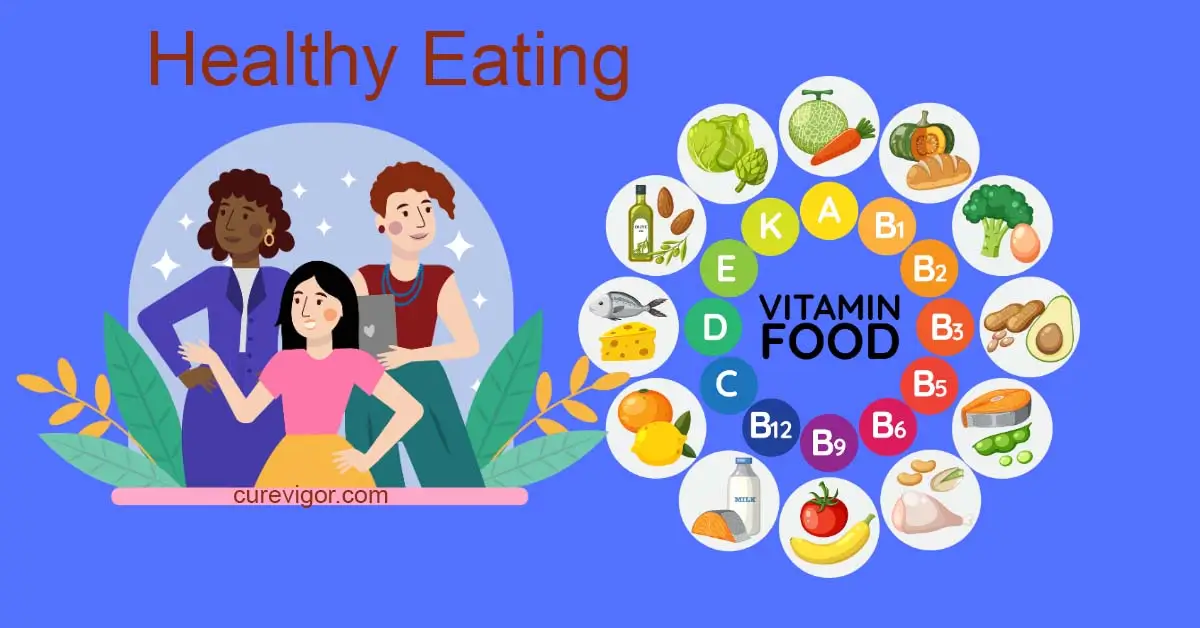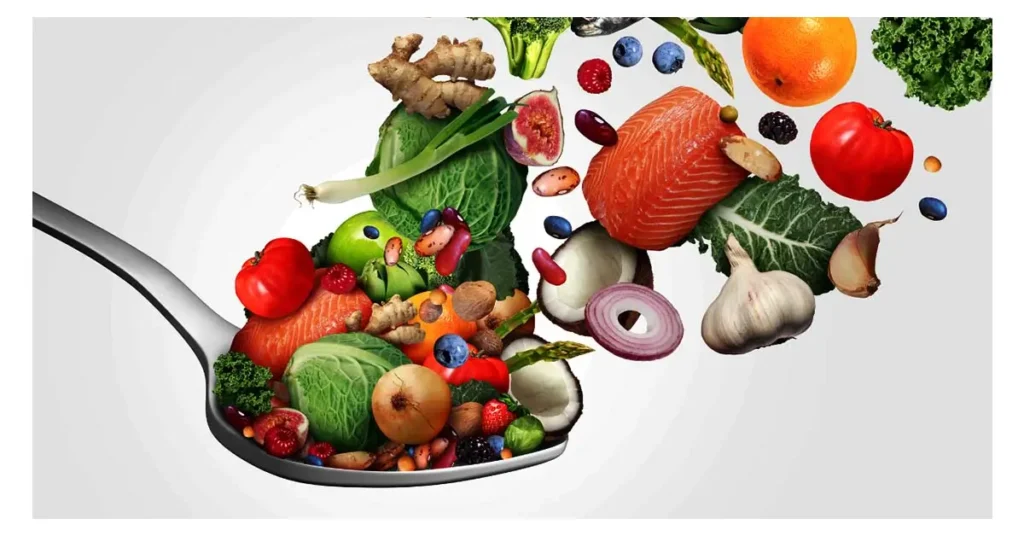Eat fresh meals and unlock better health! Discover how nutritious food choices can energize your body, boost your mood, and improve well-being for every age and lifestyle.
Thank you for reading this post, don't forget to subscribe!In a world full of fast food and quick fixes, choosing to eat fresh meals is one of the most powerful decisions you can make for your health. Fresh, wholesome foods provide the energy, nutrients, and balance your body craves—no matter your age or lifestyle. This guide explores how healthy eating can transform your daily life, help prevent chronic illnesses, and bring joy back to your plate.
Eat Fresh Meals and Fuel Your Health: Discover the Power of Healthy Eating
Everyone, regardless of age or gender, should eat fresh meals. Want to feel better, think clearer, and live longer? The secret starts with what’s on your plate. Eating fresh meals isn’t just about nutrients—it’s about fueling your life with purpose and vitality. In this guide, you’ll learn how healthy eating can transform your body and mind, whatever your age or stage.

Why Healthy Eating Matters
Healthy eating isn’t about restrictive rules or perfection. It’s about creating balance, making empowered choices, and tuning into your body’s needs. The right foods can help prevent chronic illnesses, such as diabetes, heart disease, and cancer while supporting mental focus, energy, and emotional well-being.
Eating well is essential for good health and the prevention of chronic diseases. A healthy diet can help lower your risk of heart disease, stroke, cancer, diabetes, and other health problems. Healthy eating is essential for children, women, men, and grandparents, whose nutritional needs vary according to age and gender.
The Benefits of Healthy Eating
In this blog post, we’ll look at the power of healthy eating and how it can benefit everyone in your family. We’ll also give you some pointers on incorporating nutritious foods into your daily routine.
Daily Fresh Meals for Children ˡ Eat Fresh Meals and Fuel Your Health
Healthy eating is essential for children because it provides the nutrients they need for growth and development. People who consume a nutritious diet perform better in school, have better memory, and have more energy.
Children must be encouraged to consume various fruits, vegetables, whole grains, lean proteins, and low-fat dairy products. Involving them in meal planning, preparing, and trying new foods together can make healthy eating more enjoyable. Children who consume a nutritious diet perform better in school, have better memory, and have more energy.

Daily Serves Needed by Children and Teenagers
Growing bodies need consistent nourishment. Here’s what counts as a daily service:
- Vegetables: ½ cup cooked or 1 cup raw leafy veg
- Fruits: 1 medium apple or banana
- Grains: ½ cup cooked brown rice, one slice of whole grain bread
- Protein: 1 egg, 65g cooked lean meat or legumes
- Dairy: 1 cup milk or ¾ cup yogurt
Balanced meals improve academic performance, concentration, memory, and energy levels. Encourage children to explore food through cooking, gardening, or creative presentations.
Let’s take a closer look at each of these benefits:
Academic Performance Improvement
A nutritious diet can improve academic performance by supplying the nutrients required for brain function. Omega-3 fatty acids in fish such as salmon can enhance cognitive function and memory. Studies have shown that children who eat a diet high in fruits, vegetables, and whole grains outperform those who eat a diet high in packaged foods.
Improved Memory
A healthy diet can also benefit children’s memory. The Blueberries, due to their high antioxidant content, have been shown to improve memory and cognitive function. Iron-rich foods like spinach and lean meats can also help children’s memory and attention span.
Increased Energy with Healthy Eating
A healthy diet can provide children with the energy they require to thrive. Oatmeal and brown rice are examples of whole grains that comprise starchy foods that provide sustained energy throughout the day. Lean proteins, such as chicken and tofu, can fuel and encourage muscle growth.
Healthy Meals for Women ˡ Eat Fresh Meals and Fuel Your Health
A healthy diet is essential for women because it can help prevent chronic diseases and promote overall health. Women have specific nutritional requirements, and their diets should include adequate calcium, iron, folate, and other essential nutrients.

Women’s nutritional needs differ due to changes throughout their lives. A woman’s body goes through various stages that require different nutrients, from puberty to pregnancy and menopause to aging.
Daily Serves Needed by Women
Women’s needs shift with life stages—puberty, pregnancy, menopause, and beyond. Key nutrients include:
- Calcium: 1,000–1,200 mg/day for strong bones (from milk, tofu, leafy greens)
- Iron: 18 mg/day (from spinach, red meat, legumes)
- Folate: 400–600 mcg/day during reproductive years (from citrus, beans, fortified grains)
Eating well helps balance hormones, supports reproductive health, and reduces the risks of osteoporosis and anemia. It’s about eating enough, not restricting too much.Here are some essential nutrients that women should consume:
Calcium
Calcium is a necessary mineral for the formation and maintenance of strong bones. Women are more likely than men to develop osteoporosis, a condition that causes bones to become weak and brittle, making them more prone to fractures. Women should consume at least 1,000–1,200 mg of calcium daily to prevent osteoporosis. Calcium-rich foods include dairy products, fortified cereals, tofu, and leafy greens such as kale and broccoli.
Iron is required to form red blood cells, which transport oxygen throughout the body. Women are more likely than men to suffer from iron deficiency anemia, especially during menstruation, pregnancy, and breastfeeding. To avoid iron deficiency, women should consume 18 mg of iron daily. Iron-rich foods include red meat, poultry, fish, beans, and leafy greens like spinach and kale.
Folate
Folate, also known as folic acid, is essential for the fetus’s growth and development during pregnancy. Women who want to get pregnant should get at least 400–600 micrograms of folate daily. Leafy greens, beans, fortified cereals, and citrus fruits are all good sources of folate.
Other Important Nutrients
Women should consume other essential nutrients, such as vitamin D, B12, omega-3 fatty acids, calcium, iron, and folate. Vitamin D is vital for bone health and can be obtained through sun exposure or fortified foods such as milk and orange juice. Vitamin B12, found in animal products such as meat, fish, and dairy, is essential for nerve and blood cell function. Omega-3 fatty acids in fatty fish such as salmon and tuna can help reduce inflammation and promote heart health.
Women can meet their unique nutritional needs and promote optimal health by eating a varied diet rich in fruits, vegetables, whole grains, lean proteins, and healthy fats.
A healthy diet can help women maintain a healthy weight, prevent osteoporosis, and promote healthy ageing. Women should consume a wide range of fruits, vegetables, whole grains, lean proteins, and healthy fats.
Healthy Foods for Men ˡ Eat Fresh Meals and Fuel Your Health

Men need to eat healthily just as much as women do. Men’s nutritional needs are distinct, and their diets should include plenty of lean protein, whole grains, and healthy fats.
A nutritious diet can assist men in maintaining a healthy weight, lowering their risk of heart disease and stroke, and promoting healthy ageing. Men should consume a wide range of fruits, vegetables, whole grains, lean proteins, and healthy fats.
Daily Serves Needed by Men
Men require higher energy and protein intake to support muscle mass and cardiovascular health. Ideal daily servings include:
- Lean Protein: Chicken, fish, tofu—essential for muscle repair
- Whole Grains: Oats and brown rice for sustained energy
- Healthy Fats: Avocados, nuts, and olive oil for heart and brain health
Skipping fad diets and focusing on food diversity helps men maintain weight, lower disease risk, and age with strength.
Men’s nutritional needs are distinct, and their diets should include plenty of lean protein, whole grains, and healthy fats. A nutritious diet can assist men in maintaining a healthy weight, lowering their risk of heart disease and stroke, and promoting healthy ageing. Men should include the following nutrients in their diets:
Lean protein for Healthy Eating
Protein is necessary for the body’s tissue building and repair, and men require more protein than women due to their larger muscle mass. Chicken, fish, lean beef, beans, and legumes are all excellent sources of lean protein.
Whole Grains
Whole grains are high in complex carbohydrates, which provide energy and satisfaction. Aim for at least 6–8 servings of whole grains regularly. Brown rice, quinoa, whole wheat bread, and oatmeal are good sources of whole grains.
Healthy Fats
Monounsaturated and polyunsaturated fats, for example, can help reduce the risk of heart disease and stroke. Healthy fats, such as those found in olive oil, nuts, seeds, and fatty fish like salmon, should be consumed in moderation by men.
Men should eat plenty of fruits and vegetables, which are high in vitamins, minerals, and antioxidants, in addition to these essential nutrients. They should also limit their consumption of processed foods, sugary drinks, and foods high in saturated and trans fats.
Men can meet their unique nutritional needs and promote optimal health and well-being by eating a balanced and varied diet rich in fruits, vegetables, whole grains, lean proteins, and healthy fats. A healthy diet can help men maintain a healthy weight, lower their risk of chronic diseases, and age well.
Best Diet for Elderly Grandparents ˡ Eat Fresh Meals and Fuel Your Health

A healthy diet is essential for grandparents to maintain their health and independence as they age. A nutritious diet can help to lower the risk of chronic diseases, improve cognitive function, and promote healthy ageing.
Daily Serves Needed by Older Adults
As we age, our ability to absorb nutrients slows, and our appetite changes. To support independence and longevity, older adults need:
- Calcium & Vitamin D: Strengthen bones and prevent falls
- Iron: Prevent anemia caused by medications or digestion issues
- Folate & B12: Support memory and cognitive health
Soft, easy-to-chew textures, warming foods like soups, and herb-rich recipes can make eating more enjoyable.
Grandparents should consume a wide range of fruits, vegetables, whole grains, lean proteins, and healthy fats.
Calcium
Calcium is necessary for strong bones, which can help reduce the risk of fractures and falls. As people age, their bones become more brittle and fragile, making them more prone to fractures. Grandparents should consume at least 1,200 mg of calcium daily to prevent osteoporosis and maintain bone health. Calcium-rich foods include dairy products, fortified cereals, tofu, and leafy greens such as kale and broccoli.
Iron
Iron is required to form red blood cells, which transport oxygen throughout the body. As people age, changes in the digestive system or the use of certain medications may make them more susceptible to iron deficiency anemia. Grandparents should consume 8–18 mg daily to avoid iron deficiency.
Folate, also known as folic acid, is necessary for cognitive function and for preventing chronic diseases such as heart disease and cancer. Grandparents should get 400-600 micrograms of folate every day. Leafy greens, beans, fortified cereals, and citrus fruits are all good sources of folate.
Other Essential Nutrients
Other essential nutrients, such as vitamin D, vitamin B12, omega-3 fatty acids, calcium, iron, and folate, should be consumed by grandparents.
Vitamin D is essential for bone health and can be obtained through sun exposure or fortified foods such as milk and orange juice. Vitamin B12, found in animal products such as meat, fish, and dairy, is essential for nerve and blood cell function.
What Counts as a Daily Food Serve?
Here’s a quick breakdown of standard serve sizes:
- Vegetables: ½ cup cooked, 1 cup salad greens
- Fruit: 1 medium piece or 1 cup diced
- Grains: 1 slice wholegrain bread, ½ cup cooked pasta
- Protein: 2 eggs or 100g cooked fish
- Dairy: 1 cup milk or ¾ cup yogurt
Healthy Eating on a Budget

Eat Fresh Meals doesn’t have to be expensive. Here’s how to save money while fueling your body:
- Buy in bulk: Grains, legumes, and frozen produce are affordable staples that can be stored for later use.
- Shop seasonally: Fresh fruits and veggies are cheaper and tastier in season.
- Use pantry meals: Keep lentils, pasta, and canned beans ready for quick, nutritious meals.
- Batch prep: Cook large quantities of rice, roasted vegetables, and proteins to mix and match throughout the week.
Reject One-Size-Fits-All Diets
No two bodies are the same. Don’t fall for viral diet trends or comparison traps. Focus instead on:
- What you need based on your lifestyle, health, and preferences
- Eating when you’re hungry, not the clock
- Adding more food groups rather than removing them
Mindful Habits that Change the Way You Eat
Shifting your mindset is just as powerful as shifting your diet:
- Describe your food differently: Try “energizing,” “comforting,” or “nourishing” over “good” or “bad.”
- Try mindful eating: Slow down. Notice flavors, textures, and satisfaction—even for just one bite.
- Add fiber: Think lentils, brown rice, and apples. They aid digestion and keep you full.
- Forget “eating the rainbow”: Regular veggies like carrots and cabbage are just as powerful as kale.
Practical Tips to Keep You on Track
- Create a food values list: How do you want food to serve you—energy, joy, connection?
- Batch cook and freeze: Soups, grains, and stir-fries freeze well.
- Add herbs to everything: fresh basil, cilantro, or parsley can elevate even the simplest meals.
- Don’t force “healthy swaps”: Sometimes, eating the real deal satisfies you more than the “light” version.
- Delete or mute food-tracking apps: If they make you anxious, they’re not serving you.
- Start new food traditions: Try family veggie nights, international dishes, or build-your-own bowl dinners.
Create a Positive Relationship with Food
A truly healthy diet supports both mental and emotional wellness, not just physical health. Let go of guilt, perfection, or shame around eating. Celebrate food as nourishment and culture, not just calories or macros.
Eat Fresh Meals Tips
Here are some helpful hints for incorporating healthy foods into your daily routine:
- Begin your day with a nutritious breakfast like oatmeal with fruit and nuts or a vegetable omelet.
- Pack healthy snacks for the road, such as fruit, nuts, and vegetables.
- To get various nutrients, aim to eat multiple colorful fruits and vegetables.
- Choose lean proteins like chicken, fish, and tofu, and cut back on red and processed meats.
- Brown rice, quinoa, and whole-grain bread are examples of whole grains.
- Choose healthy fats such as avocado, nuts, and olive oil, and avoid saturated and trans fats.
- Drink plenty of water and limit your intake of sugary drinks.
Conclusion ˡ Eat Fresh Meals and Fuel Your Health
Eat Fresh Meals, Live Well
From toddlers to grandparents, the power of healthy eating lies in making food a joyful, empowering part of daily life. When you eat with purpose—adding color, fiber, and flavor to your meals—you fuel more than your body. You fuel your life.
Deciding to eat fresh meals is about altering more than just what’s on your plate; it’s about changing your future. Fresh meals nourish every stage of life, whether you’re cooking for your grandparents, kids, or yourself. It is possible to transform daily eating into a potent act of vitality and self-care by adopting balanced habits, delectable ingredients, and conscious decisions.
Eat fresh, eat well, and fuel your future—one bite at a time.
FAQs on ˡ Eat Fresh Meals and Fuel Your Health
Q: What does it mean to eat fresh meals?
To eat fresh meals means choosing whole, unprocessed foods that are as close to their natural state as possible. It includes fruits, vegetables, lean proteins, whole grains, and minimally altered dairy. Fresh foods are typically seasonal, vibrant in color, and free from preservatives.
They provide maximum nutrients, better taste, and support overall health. Eating fresh also means cooking more at home and reducing the use of pre-packaged items. It’s not about perfection but about prioritizing real, whole foods. When you eat fresh meals, you’re fueling your body with clean energy.
Q. How do you maintain good health through eating fresh meals?
Maintaining good health through eating fresh meals involves several key practices:
- Balanced Diet: Ensure that your meals include a variety of foods from all the major food groups—fruits, vegetables, grains, protein foods, and dairy or alternatives.
- Portion Control: Be mindful of portion sizes to avoid overeating.
- Hydration: Drink plenty of water throughout the day.
- Limit Processed Foods: Reduce the intake of processed and sugary foods high in unhealthy fats and additives.
- Regular Meals: Eat regular, well-balanced meals and avoid skipping meals to maintain stable energy levels and metabolism.
- Mindful Eating: Pay attention to what you eat and savor your meals, which can help prevent overeating and enhance digestion.
Q: Why is it important to eat fresh meals?
Eating fresh meals is essential because it provides the vital nutrients your body needs to function optimally. Fresh produce, proteins, and whole grains are rich in vitamins, minerals, and antioxidants, providing a wealth of essential nutrients.
These nutrients support your immune system, brain function, digestion, and heart health. Fresh foods also have fewer additives, making them safer and cleaner for daily consumption. Over time, a diet rich in fresh foods can help reduce the risk of chronic diseases, such as diabetes and obesity. It improves energy, mood, and longevity. But, to feel your best, you need to eat fresh meals consistently.
Q. What are healthy meals that fuel your body?
Healthy meals that fuel your body typically include a mix of complex carbohydrates, lean proteins, healthy fats, and various fruits and vegetables. Here are some examples:
- Breakfast: Oatmeal topped with fresh berries, a sprinkle of nuts, and a dollop of Greek yogurt.
- Lunch: Grilled chicken salad with mixed greens, cherry tomatoes, cucumbers, avocado, and a vinaigrette dressing.
- Dinner: Baked salmon with quinoa and steamed broccoli, drizzled with olive oil and lemon juice.
- Snacks: Sliced apple with almond butter or a handful of raw nuts and seeds.
These meals provide sustained energy and essential nutrients and promote overall health, helping to keep you energized and focused throughout the day.
Q: Are fresh ready meals healthy?
Fresh-ready meals can be healthy, but it depends on the quality of the ingredients and the preparation method. Look for meals made with whole foods, lean proteins, healthy fats, and minimal preservatives. Check nutrition labels for sodium, added sugars, and saturated fats, which can be high in some store-bought options.
Many meal delivery services now offer nutrient-dense, balanced options tailored to dietary needs. While not as ideal as home-cooked meals, they’re often better than fast food or ultra-processed alternatives. As long as the meal focuses on freshness and real ingredients, it can be a wise choice. Prioritize meals that help you consistently eat fresh.
Read more articles about Health & Wellness Tips.
You might like to read:

